目录
1.引入
example文件夹作为我们框架项目的使用实例,在example文件夹下创建callee和caller两个文件夹
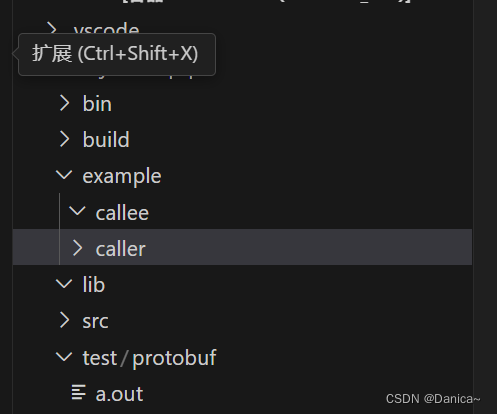
callee是RPC服务的提供者。在callee创建一个文件:userservice.cc
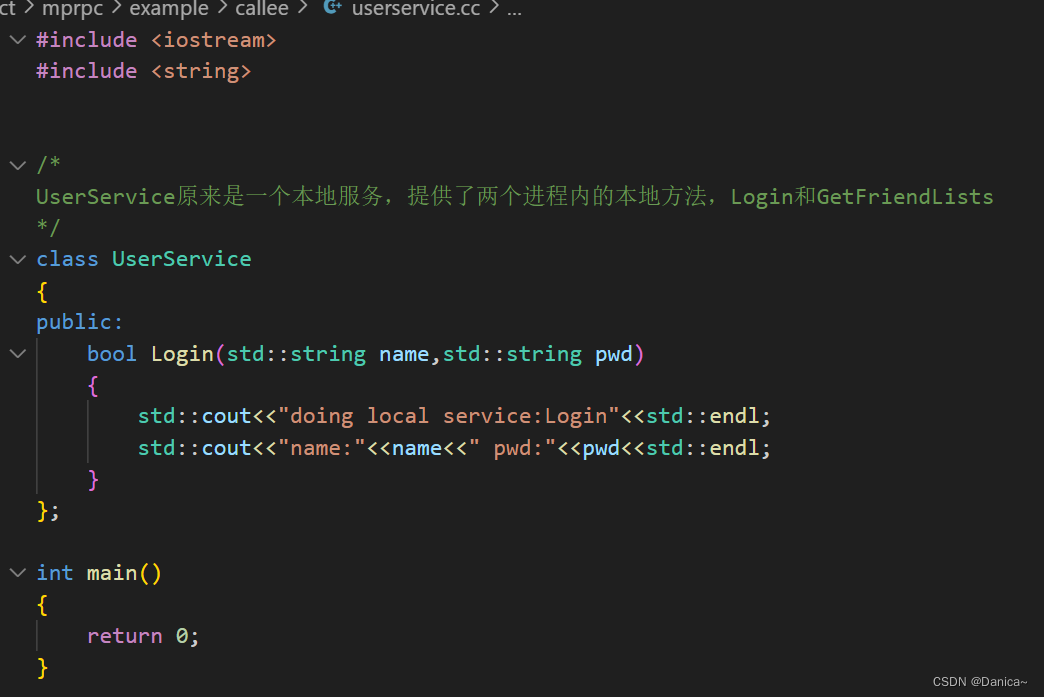
我们有没有这样一个框架,把这个UserService这个类生成的Login方法直接变成一个RPC远程方法?让在其他进程,其他机器都可以调用这个方法?
在这里我们使用protobuf进行参数和调用方法标识的序列化和反序列化。
2.user.proto
我们在example下再建一个文件:user.proto
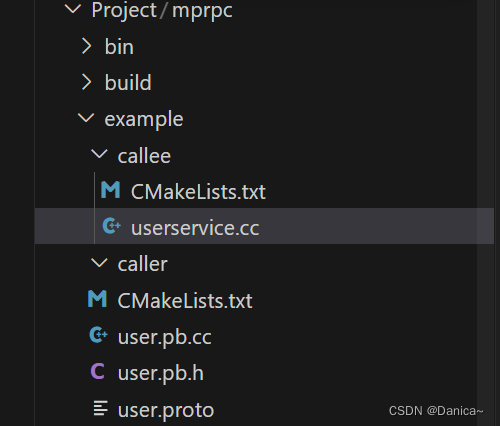
cpp
syntax="proto3";
package fixbug;
option cc_generic_services=true;
message ResultCode
{
int32 errcode=1;
bytes errmsg=2;
}
//函数的参数类型
message LoginRequest
{
bytes name=1;
bytes pwd=2;
}
//函数的返回值类型
message LoginResponse
{
ResultCode result=1;
bool success=2;
}
//RPC函数的描述
service UserServiceRpc
{
rpc Login(LoginRequest) returns(LoginResponse);
}保存退出,打开终端,进入到example下,执行
protoc user.proto --cpp_out=./
我们在CMakeLists.txt配置好相应的路径。
我们在example中再创建一个CMakeLists.txt
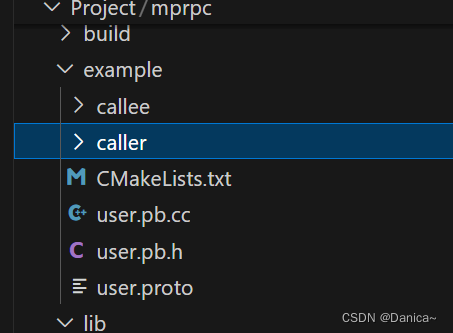
CMakeLists.txt配置如下:
cpp
add_subdirectory(callee)
add_subdirectory(caller)我们在callee和caller下各自再创建一个CMakeLists.txt
在callee的CMakeLists.txt中配置如下:
cpp
set(SRC_LIST userservice.cc ../user.pb.cc)
add_executable(provider ${SRC_LIST})#可执行文件3.userservice.cc
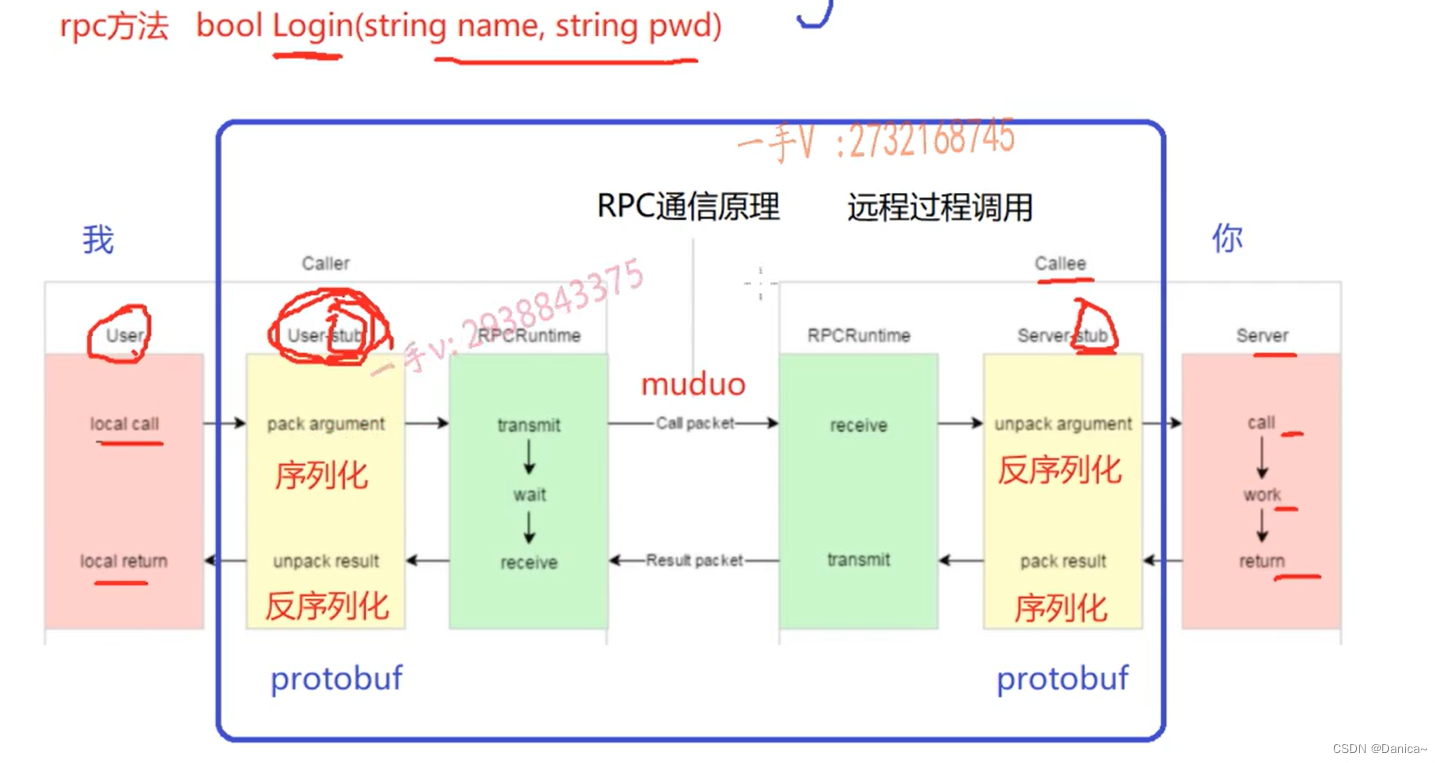
caller发送一个rpc请求,被rpc框架接受,rpc框架根据发送过来的请求,请求哪些方法,有哪些参数,然后匹配到Login方法,将这个请求上报过来,从请求中取到数据做本地业务(request),然后执行响应的响应(response),然后再执行一个回调(done)相当于把这个执行完的rpc方法的返回值塞给框架,由框架再给我们执行数据的序列化和反序列化。再通过框架的网络将响应返回回去(发送给caller),体现在Login的四个参数。

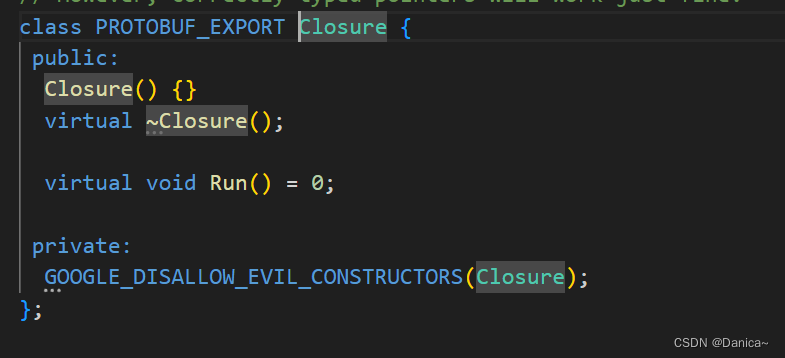
Closure是抽象类,需要重写Run方法。
userservice.cc代码:
cpp
#include <iostream>
#include <string>
#include "user.pb.h"
/*
UserService原来是一个本地服务,提供了两个进程内的本地方法,Login和GetFriendLists
*/
class UserService:public fixbug::UserServiceRpc//使用在rpc服务发布端(rpc服务提供者)
{
public:
bool Login(std::string name,std::string pwd)
{
std::cout<<"doing local service:Login"<<std::endl;
std::cout<<"name:"<<name<<" pwd:"<<pwd<<std::endl;
return true;
}
/*
重写基类UserServiceRpc的虚函数 下面这些方法都是框架直接调用的
1.caller ===> Login(LoginRequest) =>muduo => callee
2.callee ===> Login(LoginRequest) =>交到下面重写的这个Login方法上了
*/
void Login(::google::protobuf::RpcController *controller,
const ::fixbug::LoginRequest * request,
::fixbug::LoginResponse * response,
::google::protobuf::Closure *done)
{
//框架给业务上报了请求参数LoginRequest,应用获取相应数据做本地业务
std::string name = request->name();
std::string pwd = request->pwd();
//做本地业务
bool login_result=Login(name,pwd);
//把响应写入 包括错误码、错误消息、返回值
fixbug::ResultCode* code=response->mutable_result();
code->set_errcode(0);
code->set_errmsg("");
response->set_success(login_result);
//执行回调操作 执行响应对象数据的序列化和网络发送(都是由框架来完成的)
done->Run();
}
};
int main()
{
return 0;
}